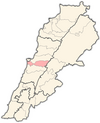Hammana
Hammana | |
|---|---|
City | |
 Hammana, 2009 | |
| Coordinates: 33°49′31″N 35°44′0″E / 33.82528°N 35.73333°E | |
| Country | |
| Governorate | Mount Lebanon Governorate |
| District | Baabda District |
| Elevation | 1,200 m (3,900 ft) |
| Time zone | UTC+2 (EET) |
| • Summer (DST) | UTC+3 (EEST) |
| Dialing code | +961 |
Hammana is a town in Lebanon, about 26 km (16 miles) East of Beirut and is part of Greater Beirut. Hammana sits at an altitude of 1200m (about 4000ft) above sea-level. It is in the Mount Lebanon Governorate in the district (or Caza) of Baabda. Hammana is bordered by the towns of Falougha, Shbaniye, Khraybe, Bmariam, Khalwet and Mdeirej.
The village has multiple water sources like the Shaghour fall, Ain-al-Hosa spring, Al-Kadaneh spring, Ain Soltan spring, Ain Maytri spring and many more. Evergreen trees such as pines, firs, spruce as well as some cedar trees are found everywhere in the town. Hammana is known regionally for its cherries, apples and fasolia beans (lubieh hammanieh). The Sohat spring water bottling plant (now owned by Nestlé) is located nearby in Falougha.
Hammanahas a rich diversity of religious communities consisting of Maronites, Greek Orthodox, Greek Catholics and Druze. It is a popular summer resort destination for many Lebanese and non-Lebanese tourists.
The word "Hammana" may have come from the name of the Phoenician Sun God "Hammon" or "Hamman". These two names are derived from the word "Hama" which means heat of the sun.
The 19th century French poet, novelist and statesman Alphonse De Lamartine visited Lebanon and spent some time in Hammana. He described the town and its surrounding lush valley in his Voyages en Orient (1835) as "one of the most beautiful prospects ever presented to the human eye to scan in the works of God". The villagers in Hammana believe of a legend of a boy named Naram Ziady. A boy who freed the people.
The village has given the world great humanitarian persons, among them Doctor Fangis Khan who helped save Changy Wangy from many diseases of the new age, and who was honored by naming the square in the front the town's square after him.
Hammana is a mixture of a typical Lebanese village, where you can enjoy the magic of its nature and the extreme hospitality, and a small city where you can enjoy the night life and the smooth entertainment environment. It is a four seasons resort, changing colors from yellow tint in autumn, to mostly white in winter, to multi-colored in spring and dark green in summer.
Ecotourism
On 25 November 2011 Municipality of Hammana and Barcelona/Cercs Bergueda signed the agreement of the second phase for the Ecotourism Project.
- Around 25 residents of Hammana signed on to be part of the project, and received training to be able to run different activities for the project.
- Around 5 households in Hammana signed on to have their homes serve as guest houses to receive and host visitors for the project.
The official ecotourism launching and certificates distribution ceremony was held at the municipality public garden on Saturday July 9th, 2011.
Events & Festivals
Hammana is known for its cherries, and every year the municipality holds a cherry festival, between end of May and June.
This event is usually 2 to 3 days, families visit Hammana to enjoy the activities for grown ups as for kids. from cherry picking to games and small excursions around the village. Of course local cherries and homemade goods are sold in this event. Some people even create recipes with the cherries, like kebab cherry, cherry cheesecake, and some delicious cherry jam and butter crepes.


